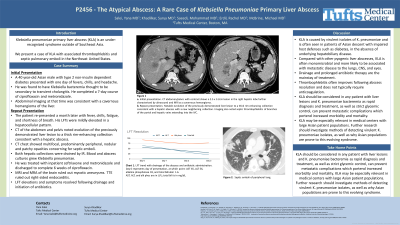Monday Poster Session
Category: Liver
P2456 - The Atypical Abscess: A Rare Case of Klebsiella pneumoniae Primary Liver Abscess
Monday, October 23, 2023
10:30 AM - 4:15 PM PT
Location: Exhibit Hall

Has Audio
- YS
Yana Salei, MD
Tufts Medical Center
Boston, MA
Presenting Author(s)
Yana Salei, MD, Surya Khadilkar, MD, Mohammad Saeedi, MD, Rachel Erdil, MD, Michael McBrine, MD
Tufts Medical Center, Boston, MA
Introduction: Klebsiella pneumoniae primary liver abscess (KLA) is an under-recognized syndrome outside of Southeast Asia. We present a case of KLA with associated thrombophlebitis and septic pulmonary emboli in the Northeast United States.
Case Description/Methods: A 40-year-old Asian male with type 2 non-insulin dependent diabetes presented with one day of fevers and fatigue. A month prior, he was hospitalized with K. pneumoniae bacteremia thought to be secondary to transient cholangitis. A CT abdomen/pelvis with contrast at the time showed a 2.5 x 3.2cm lesion in the right hepatic lobe further characterized by ultrasound and MRI as a cavernous hemangioma.
On re-admission, labs were notable for elevated LFTs (AST 65, ALT 56, alkaline phosphatase 93, and total bilirubin 1.6). A CT abdomen/pelvis showed evolution of the previously demonstrated liver lesion to a thick rim-enhancing collection consistent with a hepatic abscess with a new neighboring collection. It also noted septic thrombophlebitis of branches of the portal and hepatic veins extending into the IVC. CT chest showed multifocal, predominantly peripheral, nodular and patchy opacities concerning for septic emboli. Both hepatic collections were drained by IR. Blood and abscess cultures grew Klebsiella pneumoniae. He was treated with ceftriaxone and metronidazole. MRI and MRA of the brain ruled out mycotic aneurysms. TTE ruled out right-sided endocarditis. LFT elevations resolved following drainage and initiation of antibiotics.
Discussion: KLA is caused by virulent isolates of K. pneumoniae and is often seen in patients of Asian descent with impaired host defenses such as diabetes, in the absence of underlying hepatobiliary disease. Compared with other pyogenic liver abscesses, KLA is often monomicrobial and more likely to be associated with metastatic disease to the lungs, CNS, and eyes. Drainage and prolonged antibiotic therapy are the mainstay of treatment. Thrombophlebitis often improves following abscess resolution and does not typically require anticoagulation. KLA should be considered in any patient with liver lesions and K. pneumoniae bacteremia as rapid diagnosis and treatment, as well as strict glycemic control, can prevent metastatic complications which portend increased morbidity and mortality. KLA may be especially relevant in medical centers with large Asian patient populations. Further research should investigate methods of detecting virulent K. pneumoniae isolates, as well as why Asian populations are prone to this evolving syndrome.
Disclosures:
Yana Salei, MD, Surya Khadilkar, MD, Mohammad Saeedi, MD, Rachel Erdil, MD, Michael McBrine, MD. P2456 - The Atypical Abscess: A Rare Case of Klebsiella pneumoniae Primary Liver Abscess, ACG 2023 Annual Scientific Meeting Abstracts. Vancouver, BC, Canada: American College of Gastroenterology.
Tufts Medical Center, Boston, MA
Introduction: Klebsiella pneumoniae primary liver abscess (KLA) is an under-recognized syndrome outside of Southeast Asia. We present a case of KLA with associated thrombophlebitis and septic pulmonary emboli in the Northeast United States.
Case Description/Methods: A 40-year-old Asian male with type 2 non-insulin dependent diabetes presented with one day of fevers and fatigue. A month prior, he was hospitalized with K. pneumoniae bacteremia thought to be secondary to transient cholangitis. A CT abdomen/pelvis with contrast at the time showed a 2.5 x 3.2cm lesion in the right hepatic lobe further characterized by ultrasound and MRI as a cavernous hemangioma.
On re-admission, labs were notable for elevated LFTs (AST 65, ALT 56, alkaline phosphatase 93, and total bilirubin 1.6). A CT abdomen/pelvis showed evolution of the previously demonstrated liver lesion to a thick rim-enhancing collection consistent with a hepatic abscess with a new neighboring collection. It also noted septic thrombophlebitis of branches of the portal and hepatic veins extending into the IVC. CT chest showed multifocal, predominantly peripheral, nodular and patchy opacities concerning for septic emboli. Both hepatic collections were drained by IR. Blood and abscess cultures grew Klebsiella pneumoniae. He was treated with ceftriaxone and metronidazole. MRI and MRA of the brain ruled out mycotic aneurysms. TTE ruled out right-sided endocarditis. LFT elevations resolved following drainage and initiation of antibiotics.
Discussion: KLA is caused by virulent isolates of K. pneumoniae and is often seen in patients of Asian descent with impaired host defenses such as diabetes, in the absence of underlying hepatobiliary disease. Compared with other pyogenic liver abscesses, KLA is often monomicrobial and more likely to be associated with metastatic disease to the lungs, CNS, and eyes. Drainage and prolonged antibiotic therapy are the mainstay of treatment. Thrombophlebitis often improves following abscess resolution and does not typically require anticoagulation. KLA should be considered in any patient with liver lesions and K. pneumoniae bacteremia as rapid diagnosis and treatment, as well as strict glycemic control, can prevent metastatic complications which portend increased morbidity and mortality. KLA may be especially relevant in medical centers with large Asian patient populations. Further research should investigate methods of detecting virulent K. pneumoniae isolates, as well as why Asian populations are prone to this evolving syndrome.
Disclosures:
Yana Salei indicated no relevant financial relationships.
Surya Khadilkar indicated no relevant financial relationships.
Mohammad Saeedi indicated no relevant financial relationships.
Rachel Erdil indicated no relevant financial relationships.
Michael McBrine indicated no relevant financial relationships.
Yana Salei, MD, Surya Khadilkar, MD, Mohammad Saeedi, MD, Rachel Erdil, MD, Michael McBrine, MD. P2456 - The Atypical Abscess: A Rare Case of Klebsiella pneumoniae Primary Liver Abscess, ACG 2023 Annual Scientific Meeting Abstracts. Vancouver, BC, Canada: American College of Gastroenterology.
